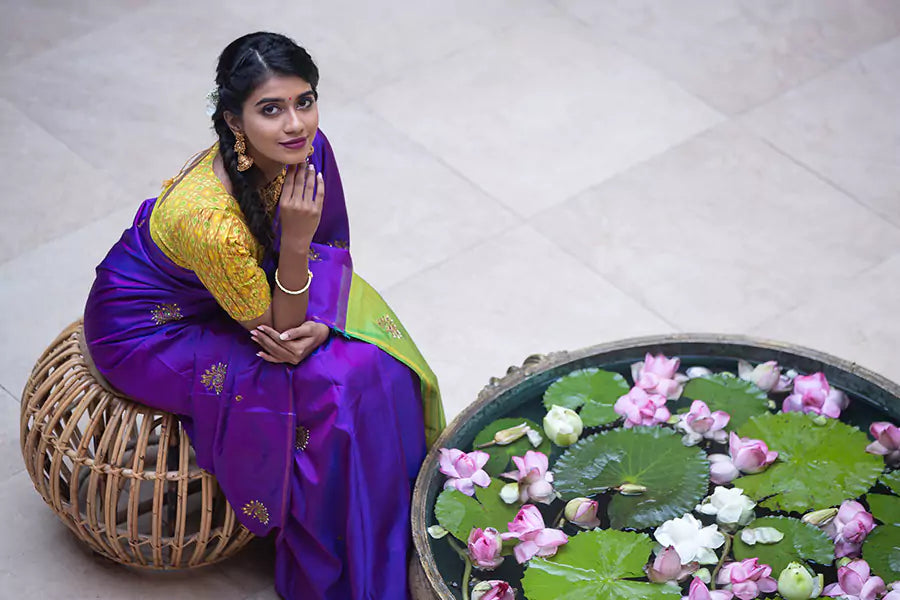The Kanchipuram silk saree has withstood the test of time with its distinguishing charm and value. Its sought-after features include design, fabric quality and most of all the unique motifs which are meticulously hand woven and imbibed in the design of these heritage sarees. This sets the traditional kanchipuram silk saree apart from the others, as they represent our culture and also include things from nature.
The symbolism of motifs in Kanchipuram silks
The pallu, body and the borders of a kanjivaram saree are intricately embellished with traditional and rare motifs that offer more than just an aesthetic appeal, they are symbols from the ethos of life.
The genius is not just in the choice of the motifs, but also in the way that these motifs are put together in the saree. How the different motifs are combined in the saree forms an ecosystem of floral, animal and geometric designs. These are the traditional kanchipuram silk sarees that The S Studio boutique in Chennai holds dear.
Let us take a look at some of these motifs, which have a prominent place in the design of any Kanchi pattu saree, as they are fondly called!
The classic Manga (Mango) motif
The mango, otherwise known as the paisley motif, is a ubiquitous fruit motif that is found in Kanchipuram silk sarees. This legendary shape owes its origins to the mango tree of the Ekambareshwar temple in Kanchipuram, which is more than 3500 years old and till date gives four varieties of mangoes and said to symbolize the four Vedas. This simple shape is woven in extraordinary ways with minute inner details or a simple standalone design that makes it a beloved motif among weavers and hence extensively used in border, pallu and body designs of a kanchipuram saree.

A touch of tradition – Rudraksham motif
The Rudraksha seeds are considered the sacred beads of the God Shiva. The symmetrical Rudraksha motif is a design element that shows how the weaver communities have adapted nature into their mesmerizing works! It finds its place among the Kanchipuram saree motifs as a contributor to weaving traditions linked with Hindu religion.

The Blossoming Thamarai or Kamalam (Lotus) motif
The lotus motif or Thamarai, woven into the rich Kanjivaram silk sarees is a reminder of the bright colours and blooming lotus flower. The eight blooming petals of the lotus flower signify new beginnings. Showcasing flowers such as the lotus, lends the weavers of Kanchipuram silks a delicate and elegant design inspired by tradition and Hindu mythology.

Majestic Mayil (Peacock) Chakaram motif
The unmatched grace and beauty of the Mayil (peacock) is paired with the circle of life (chakaram) to form one of the most beautiful and meaningful motifs in Kanjivaram sarees. The geometric patterns formed with the Mayil Chakram motif is a symbol of protection straight from our rich mythology. The city of Kanchipuram itself is depicted as a peacock in ancient scripts. Athiyur, the place where the Varadharajaswamy temple is located, is referred to as the head of the peacock, while the Kanchi temple forms the body. This probably took shape in the form of ‘mayil chakaram’ motifs in Kanchi silk sarees.

The sophisticated Thazhampoo Reku motif
Derived from the Kewra plant, traditional thazhampoos are depicted along the border of a kanchipuram silk saree to form the sophisticated ‘Thazhampoo Reku’ motif in which reku refers to the pattern by which the border and body are woven together. These textile designs are a significant part of the South Indian identity, bringing culture and weaves together for every Indian women who cherishes her cultural roots.

The Kanchi silk sarees from The S Studio – a work of art!
In any kanchipuram pattu saree, motifs account for a distinct part of the design vocabulary.
The Kanchipuram silk sarees from The S Studio, Chennai exude a timeless appeal that never fails to impress. They offer a tribute to the intrinsic traditions and the mythology of ancient times in textile design woven in a handloom kanchipuram silk saree.


